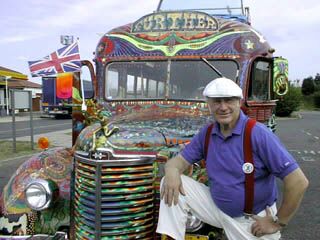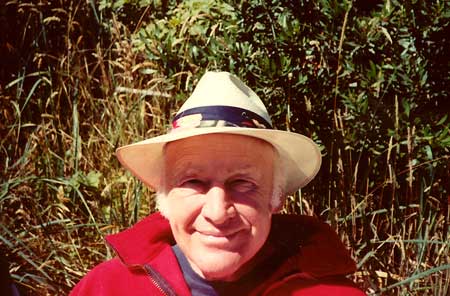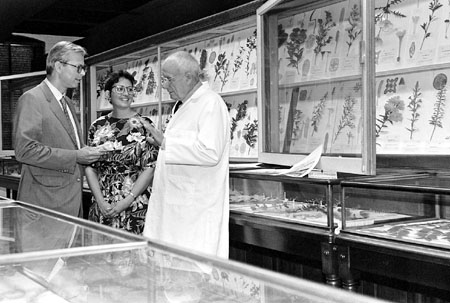I didn't miss this, but have been too bummed in general to post it. They are coming too fast and furious these days -- Kleps, Leary, Garcia, D.M. Turner, Janiger, Lilly, McKenna -- now these. Time is relentlessly ending yet another era, and there is less color in the world without them all.
The first bit below was written by Kesey's campadre and fellow Prankster, Ken Babbs. As for the second -- I wouldn't put it past either of them.......

- Ken Kesey -- B: September 17, 1935 -- D: November 10, 2001
Kesey's belly was hurting and the docs did a scan and found a black spot on his liver. It was cancerous but encapsulated which meant there was no cancer anywhere else. They decided to cut it out and the surgery went okay. He had sixty percent of his liver left to carry the load but in one of those dirty tricks the body can play on you everything else went to hell and this morning at 3:45 AM his heart stopped beating.
A great good friend and great husband and father and grand dad, he will be sorely missed but if there is one thing he would want us to do it would be to carry on his life's work. Namely to treat others with kindness and if anyone does you dirt forgive that person right away. This goes beyond the art, the writing, the performances, even the bus. Right down to the bone.
-- Ken Babbs
TUESDAY, NOVEMBER 13, 2001
"Now, all you people over there, get the news spread around that they're going to do a memorial service for me at the McDonald theater in downtown Eugene at noon tomorrow and if you can't get inside we are going to put speakers out on the sidewalks so everyone can hear all that hoopla bound be to spreading out of the theater like moths on the wing. It says here they are going to bury me in private. Babbs says there's been thousands of emails and he wants me to thank you all for writing. Meanwhile, I've still lots of forms to fill out and they're looking for a bigger halo but durned if I'm going to play that harp. I'm holding out for the thunder machine. See you around."
-- Kesey

(For more on the Kesey-Babbs partnership, go here. And Salon, it turns out, has a nice selection of fond Ken remembrances.- Ed.)
- Richard Evans Schultes (Jan 12, 1915 - April 10, 2001)
Richard Evans Schultes was a botanical explorer, ethnobotanist and conservationist, who carried out extensive field studies, particularly in the Amazon, specializing in natively used medicinal and toxic plants and on new sources of rubber. Boston-born and Harvard-educated, he was Jeffrey Professor of Biology and Director of the Botanical Museum of Harvard University (Emeritus). Schultes published over 400 technical papers and nine books on ethnobotany and was widely recognized as one of the most distinguished figures in the field. He received many awards for his work including the Cross of Boyaca (Colombia's highest honour), the annual Gold Medal of the World Wildlife Fund, the Tyler Prize for Environmental Achievement and the Linnean Gold Medal (the highest award in the field of botany).
- Richard Schultes, medicinal plant expert, dead at 86
Richard Evans Schultes, the Edward C. Jeffrey Professor of Biology Emeritus and renowned expert on medicinal uses of plants, died April 10 in Boston at age 86.
Schultes is considered by many the father of modern ethnobotany - the study of native people's uses of locally available plants. He was known for his wide travels through the Amazon collecting plants and talking with local people. In 1992, he received the gold medal from the Linnean Society of London, considered botany's top honor.
Schultes first came to Harvard as an undergraduate and stayed through his graduate years. He received an A.B. in 1937, an A.M. in 1938, and a Ph.D. in 1941.
Schultes' fieldwork, conducted mostly in the Colombian Amazon beginning in 1941, made him a leading voice in the field and one of the first, in the 1960s, to warn about destruction of the rainforests and the disappearance of their native people.
"I think one of the things his work did that previous work didn't was he brought in a scientific background. He tried to look at the [plants' active] compounds, at their biology and biochemistry," said Donald Pfister, the Asa Gray Professor of Systematic Botany and curator of the Farlow Library and Herbarium.
Before joining Harvard's professorial ranks, Schultes served in various positions at the Harvard Botanical Museum. He was a research associate from 1941 to 1953, curator of the Orchid Herbarium of Oakes Ames from 1953 to 1958, curator of economic botany from 1958 to 1985, executive director from 1967 to 1970, and director from 1970 to 1985.
He became a professor of biology at Harvard in 1970, the Paul C. Mangelsdorf Professor of Natural Sciences in 1973, the Edward C. Jeffrey Professor of Biology in 1980, and became the Edward C. Jeffrey Professor of Biology Emeritus in 1985.
Schultes' adventurous travels in pursuit of science spawned books and articles, including "One River" in 1996 by Wade Davis, a student of Schultes. Another student, Mark Plotkin, followed in Schultes' footsteps, writing a popular account of his own travels in "Tales of a Shaman's Apprentice," published in the early 1990s.
Schultes himself wrote 10 books and hundreds of scientific articles. In addition to being an authority on the medicinal uses of plants, he became a leading authority on rubber-producing plants during World War II, at the request of the U.S. government. He was a member of numerous scientific societies, the editor of botanical journals, and the recipient of many honors.
Pfister, who knew Schultes as a senior faculty member, said his demeanor was somewhat contrary to the "swashbuckling" image his scientific travels gave him. Pfister described Schultes as a "very charming and kind man" who was courteous to both senior and junior people. Having spent much of his career at Harvard and having completed both graduate and undergraduate degrees at Harvard, Pfister said Schultes felt very strongly that Harvard should be the best in everything.
"I saw him as a very senior and very mature member of the department," Pfister said. "He always wore a lab coat, he always wore a red tie and he was fiercely Harvard."

Schultes is survived by his wife, Dorothy Crawford McNeil, and their three children: Richard Evans Schultes II, Alexandra Ames Schultes Wilson, and Neil Parker Schultes.
A memorial service is scheduled for April 29 at King's Chapel in Boston.